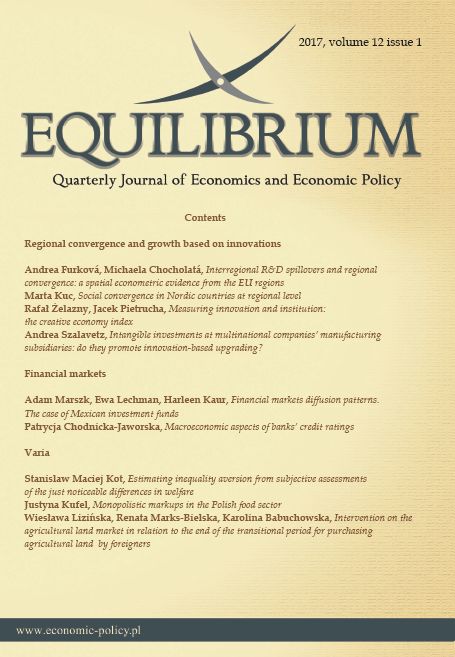INTANGIBLE INVESTMENTS AT MULTINATIONAL COMPANIES’ MANUFACTURING SUBSIDIARIES: DO THEY PROMOTE INNOVATION-BASED UPGRADING?
INTANGIBLE INVESTMENTS AT MULTINATIONAL COMPANIES’ MANUFACTURING SUBSIDIARIES: DO THEY PROMOTE INNOVATION-BASED UPGRADING?
Author(s): Andrea SzalavetzSubject(s): Economy, National Economy
Published by: Instytut Badań Gospodarczych
Keywords: intangible investments; MNC subsidiaries; upgrading; Hungary
Summary/Abstract: Research background: Despite a widely acknowledged importance of intangible capital as the main driver of value creation, papers discussing corporate intangible investments tend to focus only on multinational companies, i.e. on headquarters (HQ). There are few papers scrutinising the specific attributes of intangible investments at manufacturing subsidiary level. This is, however, an important topic to investigate, since intangible investments can boost subsidiary upgrading. Intangible investments contribute to subsidiaries’ acquiring capabilities that allow them to enhance the scope of their responsibilities and specialise in increasingly high-value activities. Purpose: The purpose of this paper is to explore the features of intangible investment at MNCs’ manufacturing subsidiaries, on the example of Hungary. Research questions addressed are as follows. a) What exactly do local manufacturing subsidiaries invest in, when they implement intangible investments? b) Is there a difference between the role of intangible investments at MNC level and at manufacturing subsidiary level? c) What is the association between subsidiary-level intangible investments and upgrading? Methodology: We analyse a sample of 44 manufacturing subsidiaries in the Hungarian automotive and electronics industries. We carry out a qualitative content analysis of sample companies’ notes to their financial statements, complemented with other sources of corporate information. Findings: We find that intangible investments are aligned with subsidiaries’ functional specialisation: with operations. Their main role is to contribute to subsidiaries’ absorption of the headquarters’ technology transfer and enhance the productivity of the local core activities. This is sharply different from their traditional, MNC-level role: support to non-price competitiveness. We find support for the argument that subsidiary-level intangible investments and subsidiary upgrading are associated in a self-reinforcing virtuous circle.
Journal: Equilibrium. Quarterly Journal of Economics and Economic Policy
- Issue Year: 12/2017
- Issue No: 1
- Page Range: 63-80
- Page Count: 18
- Language: English

